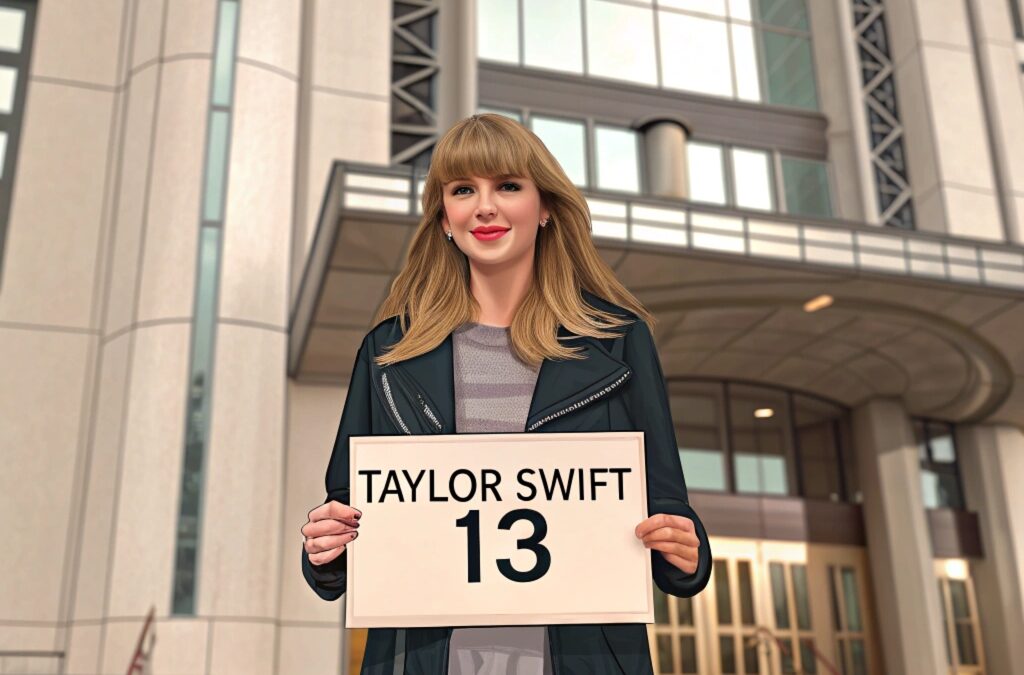It’s no secret that Taylor Swift loves 13. Since her 2006 self-titled debut album, the multi-Grammy winner has found ways to incorporate this supposedly unlucky number throughout her work.
Her passion is visible throughout her career, especially on her tenth studio album, *Midnights,* which has 13 tracks instead of 12. This album made Swift the first artist to top Billboard’s Hot 100 10 at once.
Since Swift influenced the release date of *The Exorcist: Believer* to allow her record-breaking *Eras Tour* film to premiere on Friday, October 13, her followers have grown more aware of her love for 13. As she hides this number in music videos, award acceptance speeches, and other places, Swifties are used to spotting it.
Why is Swift obsessed with 13? There are various reasons.
Swift typically wrote 13 on her palm when she started her career. She said, “It’s really weird.” on *The Tonight Show with Jay Leno* in the late 2000s, explaining why it was her lucky number.
She told Leno why the number was important, even when the superstition disappeared. Born on the 13th, I turned 13 on Friday the 13th. My first album went gold in 13 weeks, and my first number-one hit had a random 13-second start. Plus, anytime I win an award, I sit in the 13th row or row M, the 13th letter of the alphabet.”
Also interesting: “The first time I ever performed on *The Tonight Show* was on February 13, 2007.”
Imagine her pleasure when she wins her 13th Grammy! Expectations are rising for that moment. Her album *Midnights* was not nominated for the 2023 Grammys, although it may win in 2024. Maybe we’ll hear about *Reputation*’s re-recording then. We will continue to look for 13s till then. Ready, break!
The number 13 has historically been viewed as unlucky in numerous Western cultures. Even in today’s less superstitious society, a surprising number of individuals harbor a genuine fear of 13, known as triskaidekaphobia. As a consequence, many hotels exclude a 13th floor from their listings (with Otis Elevators reporting that 85% of their elevator panels omit this number), and several airlines bypass row 13. Additionally, the more specific fear associated with Friday the 13th, termed paraskevidekatriaphobia, leads to economic losses exceeding $800 million annually in the U.S., as many people choose to avoid travel, marriage, or work on this day perceived as unlucky.
Why is the number 13 seen as a symbol of misfortune? What factors have contributed to its association with bad luck? While the exact origins of this superstition remain unclear to historians and academics, various historical, religious, and mythological elements may have converged to cultivate the fear of 13.
One early example is the Code of Hammurabi, one of the first comprehensive legal codes established by the Babylonian King Hammurabi, who ruled from 1792 to 1750 BCE. This code, inscribed on a large stone pillar, contained around 282 laws, but notably, the 13th rule was absent. This omission is frequently cited as an early indication of the number’s negative connotation, though some scholars attribute it to a clerical mistake. Regardless, it may have played a role in establishing the enduring negative associations with 13.
Additionally, Norse mythology may have reinforced the superstition. In a particular myth, 12 gods are attending a dinner at Valhalla when a 13th guest, the mischievous god Loki, arrives unexpectedly. Loki orchestrates a scenario that leads to the blind god Hoder fatally wounding Balder the Beautiful, the god of joy, with an arrow. This tragic tale may have strengthened the link between 13 and chaos in Nordic cultures, and later in Western society.
Christianity has also significantly contributed to the negative sentiment surrounding the number 13. In the New Testament, a pivotal gathering occurs at the Last Supper, where Jesus Christ is joined by his Twelve Apostles—making for a total of 13 participants. Judas Iscariot, the apostle who betrays Jesus, is often regarded as the 13th guest. This association likely influenced the perception of Friday the 13th as an ill-fated day, considering the Last Supper happened on a Thursday, followed by the crucifixion on Friday.
Lastly, the unfavorable view of 13 may stem from the positive connotations of the number 12. In Christian numerology, 12 is often seen as a symbol of divine power and completeness, a sentiment echoed in earlier cultures. Consequently, 13 might be regarded as a disruptive force against this notion of order and perfection, reinforcing the longstanding belief that it is an unlucky number.
Now why do I bring up the number ‘13’? No, no, I do not have any connection with Taylor Swift (I am not a ‘Swiftie”). Well…the first date I had with my now wife, occurred on a 13th…which happens to be her father’s birthday. We were also married on the 13th…31 months after that first date. On our honeymoon we played one spin of the roulette wheel…yes, number 13…and it hit! Even when our anniversary occurs on a Friday the 13th, we find it lucky and far, far from something to be nervous. PS. I was also the 13th member of my fraternity pledge class when I initiated… I recognize Taylor’s infatuation with 13…but she’s going to have to share it with me.

